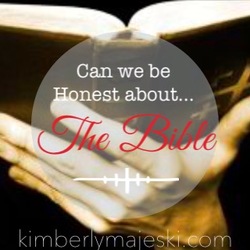|
|
 She was always there in her red velvet robe, coffee brewing, steam swirling red fine point pen in hand, my mother bent over the scriptures which lay open on our kitchen table in the blue pink pre morning dawn. In the field beside our home, the farmer would get the cows up while my mother would scour the worn well paper thin pages of her bible for words of hope and peace. I grew up in a home where the bible was revered and read but not always understood. My earliest memories are my mother imparting the stories of Abraham and Sarah, Miriam and Moses, Jesus and Mary to me so that these narratives imprinted themselves upon my heart until I deep loved and knew them as well as my own. Though we read the bible faithfully, tried to own the stories, tried to live according to God’s plan our humanness often broke in and we were rude and short tempered, we were disrespectful and lazy, there were lies and adultery, compassion and jealousy, there was competition and betrayal-- we were nothing like the heroes whose stories we regaled—or so we thought. As I grew and studied the stories of my childhood, the felt board characters and bedtime tales became my life’s work, my academic and spiritual focus and I learned we were perhaps a lot more like the folks in the ancient text than I had previously thought. It turns out we had skipped lots of the most important parts in Sunday School, hadn’t heard a lot of sermons about the failures, the imperfections, the neuroses. We never spoke of Abraham trading his wife for favor with the king, not once but twice while he ever remaining the “friend of God.” We said nothing of God’s own attempt to kill Moses on the way down to Egypt after sending him. I missed the story where Lot’s daughters got him drunk so that they could seduce him or of Tamar’s desperation and her scheme to become pregnant so that she dressed like a prostitute to have sex with her father in law which resulted in the blessing of twins. I’m certain I didn’t really know what transpired between Ruth and Boaz or how or why Jesus said, “if you don’t hate your family you cannot be my disciple.” It seems like today in a world torn by war and violence, where discrimination runs rampant in and outside of the church, where children are killed in the streets and marriages are torn asunder where we fight obesity and starvation on the across the same globe, it might be important to be honest about what the bible does and does not say. To confess what is true, that in some cases we have decided certain parts don’t apply any more but other parts do. We’ve made peace with eating shellfish but battles still rage over the definitions of marriage and the status of women in ministry. It feels like holding space for a real conversation about the tattered pages of scripture, the stories of our fore parents who tell us how they understood themselves and how they knew God is a sacred undertaking. It seems true that a discussion about how texts have been interpreted across the ages and in different cultures and communities might help us find our way. Perhaps a confession that the Bible is an artifact of the divine human relationship, illumined by Spirit work and fraught with human struggle is a refreshing and needed proclamation. Maybe though we agree everything necessary for salvation is right there, sewn into the pages, so is a lot of confusion as well as help for our broken, bruised, needy selves if we will trust the work of the Spirit in community to walk with us. Join me on the blog to get honest, gritty and real about what the text says, what it doesn't say and what it meant to the community out of which it was formed and how it has been used across the centuries—here we will be honest about the Bible.
3 Comments
Joe Allison
2/4/2015 08:59:53 am
A journey worth taking! May God grant equal measures of courage and faith.
Reply
Leave a Reply. |
Subscribe Today for Free GiftBLOG
Archives
July 2019
Categories
All
|

 RSS Feed
RSS Feed